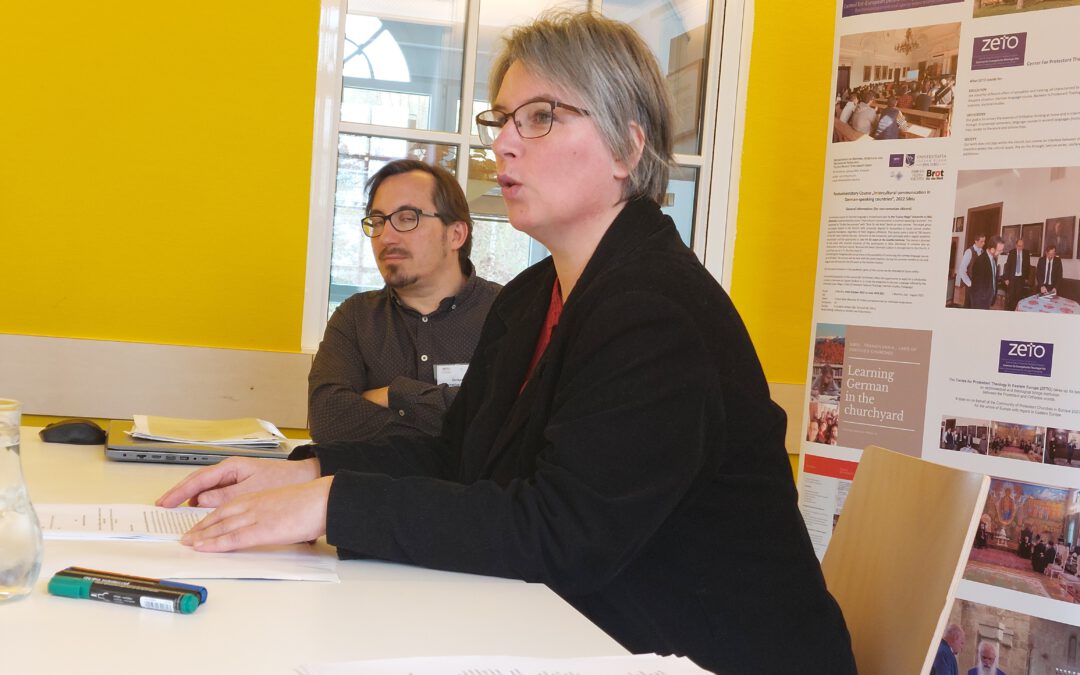In jeder Sprache stecken hinter dem Wort „Bildung“ andere Bausteine und Zielvorstellungen. So auch in den Sprachen und dem Handeln der evangelischen Minderheitenkirchen in Osteuropa. Es geschieht in inhaltlicher Abgrenzung aber in Konkordanz der Einstellung zu dem bestimmenden orthodoxen Gegenüber.
Bei beiden Kirchen vermischen sich mit der akademischen Bildung deutliche Elemente von Erziehung, Einübung und Sozialisation. Auch in der aktuellen Praxis der theologischen Ausbildung lassen sich diese Linien erkennen. Kognitive Lernprozesse sind an Einübung sozialer Formen und an identitätssichernde Diskurse gekoppelt. So geschieht es für das Ungarische in Kolozsvár, das Slowakische in Novi Sad oder das Deutsche in Hermannstadt. Dort aber, wo nationale Anbindung verloren gegangen ist, etwa zertrümmert durch den Sowjetstaat, ist ebenfalls die Suche nach Identität prägend. Wer sind wir, wie verhalten wir uns zu unseren Wurzeln, was unterscheidet uns von der Mehrheit und was kann Menschen bewegen zu uns zu kommen? Das erdet die theologische Ausbildung und bringt sie näher an die Gemeinde.
Innerhalb solcher Analysen verlief die Tagung des Zentrums für Evangelische Theologie Ost (ZETO) in Bad Kissingen, vom 2.-4.11.2022. Evangelische Beiträge brachten die Referenten Prof. Dr. Klaus Fitschen (Leipzig), Prof. Dr. Martin Illert (Hannover), Prälat Markus Schoch (Reutlingen) und Pfarrerin Gunda Wittich (Moers). Die Orthodoxie kam durch Vater Dr. Alexandru Ioniță (Sibiu) und Dr. Octavian Mihoc (Genf) zu Wort. Studienberichte über die Bildungssituation von protestantischen Minderheitskirchen im orthodoxen Umfeld, Kurzfilme zu Bildungsbiografien von Theologen und Theologinnen sowie Einblicke in theologische Ausbildungsstätten der Region ergänzten das Bild. Als gute Weitervermittler für das Denken und die Anliegen der evangelischen Kirchen im orthodoxen Kontext waren bei dieser Tagung Vertreter aus den Gliedkirchen der EKD sehr willkommen
Unter der Schirmherrschaft der GEKE geht die Arbeit der internationalen theologische Studiengruppe – mit Unterstützung des DNK des LKW und der Evangelischen Kirche A.B. in Rumänien – weiter. Angedachte Themen sind die Rolle der evangelischen Diakonie in orthodoxen Gesellschaften, Interferenzen bei Kasualien oder auch das schwerwiegende Thema von Nation und Konfession.
Stefan Cosoroaba
In every language, there are different pieces and objectives behind the word “education.” So also in the languages and the actions of the Protestant minority churches in Eastern Europe. It happens in content differentiation but in concordance of attitude to the determining Orthodox counterpart.
In both denominations, clear elements of education, training and socialization are intermingled with the academic education. These lines can also be seen in the current practice of theological formation. Cognitive learning processes are linked to the practice of social forms and to identity-securing discourses. This is what happens for Hungarian in Kolozsvár, Slovak in Novi Sad or German in Hermannstadt. In places where national ties have been lost, for example, shattered by the Soviet state, the search for identity is also formative. Who are we, how do we relate to our roots, what distinguishes us from the majority and what can motivate people to come to us? This grounds theological education and brings it closer to the community.
Within such analyses ran the conference of the Center for Protestant Theology in Eastern Europe (ZETO) in Bad Kissingen, Nov. 2-4, 2022. Protestant contributions were made by the speakers Prof. Dr. Klaus Fitschen (Leipzig), Prof. Dr. Martin Illert (Hannover), Prelate Markus Schoch (Reutlingen) and Pastor Gunda Wittich (Moers). Orthodoxy had its say through Father Dr. Alexandru Ioniță (Sibiu) and Dr. Octavian Mihoc (Geneva). Study reports on the educational situation of Protestant minority churches in the Orthodox environment, short films on educational biographies of theologians, and insights into theological training institutions in the region completed the picture. As good mediators for the thinking and concerns of the Protestant churches in the Orthodox context, representatives from the member churches of the EKD were very welcome at this conference.
Under the auspices of CPCE the work of the international theological study group – with the support of the GNC of LWF and the Evangelical Church A.C. in Romania – continues. Thought topics are the role of the protestant diaconia in Orthodox societies, interferences in casuals or the heavy topic of nation and denomination
